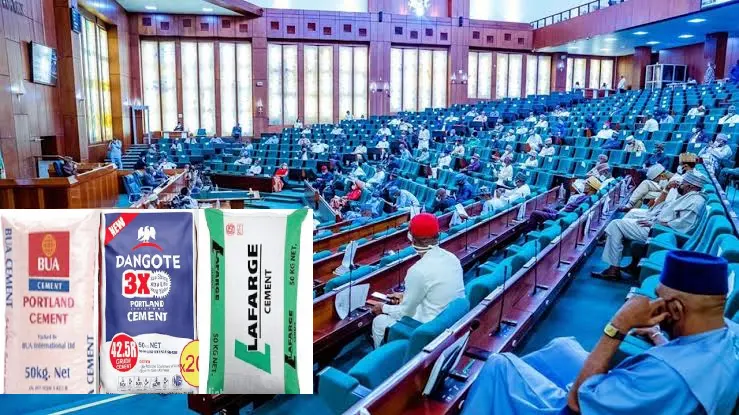The House of Representatives has taken a significant step to address the rising prices of cement across Nigeria. They’ve given a clear ultimatum to key players in the cement industry, including Dangote Cement, BUA, and Lafarge Ashaka, to appear before them within 14 days.

This directive came from the Chairman of the House Committee on Solid Minerals, Mr. Gaza Gbefwi, during a public hearing held in Abuja.
The Issue at Hand in cement high price
The House had previously initiated a motion on the “Arbitrary increase in the price of cement by the cement manufacturers in Nigeria.” Following this motion, a joint committee was formed to investigate the matter and propose necessary legislative actions. However, during the recent public hearing, none of the concerned cement companies attended or sent representatives to present their case.
Read also:
- Cement Price Drops as Dangote, BUA, Lafrage and Others Offer Relief from Soaring Costs
- Man accused of stealing cement jumps into Lagos lagoon, dies
The Ultimatum and Parliament’s Stance
Expressing his dismay at the absence of the companies, Mr. Gbefwi emphasized the parliament’s commitment to the welfare of Nigerian citizens. He underscored the critical role of cement in construction and the nation’s development. He stressed that the parliament would not tolerate exploitation of the citizens by corporations, especially when basic needs like shelter are at stake.
The Speaker’s Assurance and Legislative Intent to resolve cement prices
The Speaker, represented by Deputy Speaker Benjamin Kalu, reassured the invited companies that the parliament’s aim is not to target them but to find solutions to the challenges faced by the building sector. He highlighted the necessity of collaborative efforts between manufacturers and end-users to improve living standards. Moreover, he affirmed the parliament’s dedication to enacting laws that prevent future occurrences of price hikes.
Understanding the Situation
Deputy Speaker Kalu pointed out the staggering housing deficit in Nigeria, estimated at about 16.9 million units, with major cities experiencing a 20% increase in housing needs annually. This deficit underscores the urgency of ensuring affordable cement prices to facilitate construction, both in the public and private sectors.
Factors Contributing to Price Hikes
While acknowledging external factors like exchange rates, Kalu also mentioned positive developments, such as Nigeria’s strengthened currency against the dollar and improved credit outlook. However, he stressed the need for sustained efforts to stabilize cement prices and address the widening gap between supply and demand.
Assessment of Cement Prices
Mr. Gbefwi highlighted the significant price disparity between Nigeria and other African countries like Kenya, India, and Zambia. Nigeria’s cement prices, he noted, are considerably higher, raising questions about the underlying reasons for this difference. This assessment forms a crucial part of the investigation aimed at understanding and rectifying the situation.
Collaborative Solutions for a Better Future
The parliament’s inquiry into the cement price hikes reflects a broader commitment to the well-being and prosperity of Nigerian citizens. By engaging stakeholders, identifying challenges, and proposing legislative measures, they aim to create an environment conducive to affordable housing and sustainable development.
Read also:
- Ayo Edebiri shined in this backless column dress by Loewe at MET Gala 2024
- Drama as Secondary School Students Arrive Graduation in Helicopter, Flashy Convoy, Video Trends
- ThankGod Ikoma, Survivor of The Boat Accident That Killed Junior Pope Reveals That Mercy Johnson Was with Them in The Boat
- Fans angry, calls on organizers to ban Doja Cat from Met Gala after wearing wet T-Shirt and bathroom towel to event
- Fake medical doctor arrested by Police in Lagos
- Five levies Nigerians pay for electronic transactions
- Viral video: Netizens call for suspension of group who bullied Ekiti students
- EFCC Interrogates Six Senior NSCDC Officers over N6 Billion Fraud
- Old video of Mercy Johnson and Angela Okorie in heated clash trends
- “Fear Drove Them to God”: Actors Storm Pastor Jerry Eze’s Church For Prayers After Jnr Pope’s death
- Abuja barber gains over 20K followers following clash with Davido
- Pastor Commands Miraculous Credit Alert from Heaven During Service: Viral Video
- VeryDarkMan Criticizes Samklef for Criticizing Simi and Adekunle Gold
- Toke Makinwa says “Bleaching My Skin Was The Biggest Mistake Ever”
- “Definition of a strong woman” – Phyna brags as she shares from her vacation in Maldives
- The Art of Great Kissing: Insights from Psychologists and Experts
- Opay warns Customers About Three Types of Transactions on Its Platform
- What!!: Nigerian man uses IV bag to slowly drip fuel into generator to reduce usage
- How to identify when a child is being bullied



